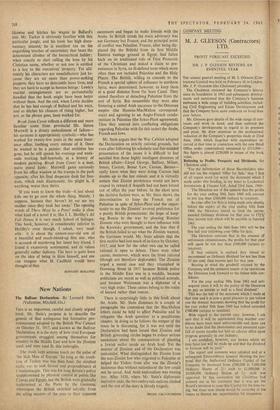New Nations
The Balfour Declaration. By Leonard Stein. (Vallentine, Mitchell, 63s.) Tins is an important, careful and closely argued book. Mr. Stein's purpose is to describe the genesis of that ambiguous but formative pro- nouncement adopted by the British War Cabinet on October 31, 1917, and known as the Balfour Declaration. It is the story of how rival European governments struggled among themselves for mastery in the Middle East and how the Zionists used. and were used in, this imbroglio.
The rivals kept anxious touch on the pulse of the Sick Man of Europe.' So long as the condi- tion of Turkey was less than fatal, the simplest tactic was to seek favour and preponderance at Constantinople. This was for long Britain's policy (supplemented by physical control at points like Cyprus and Egypt), but the British were gradually undermined at the Porte by the Germans, whereupon the British switched adroitly from the ailing masters of the area to their apparent
successors and began to make friends with the Arabs. In British minds the main adversary was not Germany but France, and the principal point of conflict was Palestine. France, after being dis- placed (by the British) from its first Middle Eastern vantage ground in Egypt, had fallen back on its traditional role of First Protector of the Christians and staked a claim to pre- eminence in Syria, an ill-defined term which more often than not included Palestine and the Holy Places. The British, willing to concede to the French a special sphere of influence in northern Syria, were determined, however, to keep them at a good distance from the Suez Canal. They aimed therefore at detaching Palestine from the rest of Syria. But meanwhile they were also fostering a united Arab successor to the Ottoman empire (the Hussein-MacMahon correspond- ence) and agreeing to an Anglo-French condo- minium in Palestine (the Sykes-Picot agreement). Thus they entered into conflicting obligations regarding Palestine with (in this order) the Arabs, French and Jews.
Mr. Stein argues that the War Cabinet adopted the Declaration on strictly rational grounds, but even after following his scholarly and fair-minded presentation of the issues it is difficult to feel satisfied that those highly intelligent directors of British affairs—Lloyd George, Balfour, Milner, Smuts, Curzon, Bonar Law, Carson, Barnes— really knew what they were doing. Curzon had doubts up to the last minute and it is virtually certain that Zionist persistence would not have reaped its reward if Asquith had not been forced out of office the year before. In the short term the decisive factors were, as Mr. Stein shows, the determination to keep the French out of Palestine in spite of Sykes-Picot and the oppor- tunity to use the Zionists' avowed preference for a purely British protectorate; the hope of keep- ing Russia in the war by pleasing Russian Zionists who were thought to have influence with the Kerensky government; and the fear that if the British failed to say what the Zionists wanted, the Germans would. Mr. Stein admits that the first motive had lost much of its force by October, 1917, and how far the other two can be called rational is open to debate. There were other causes, moreover, which were far from rational (though not therefore deplorable). The Zionists urged a moral case and they triumphed in Downing Street in 1917 because British policy in the Middle East was in a muddle, because politicians are moral as well as political animals, and because Weizmann was a diplomat of a very high order. These causes belong to the realm of hazard rather than reason.
There is surprisingly little in this book about the Arabs. Mr. Stein dismisses in a couple of paragraphs the contention that the MacMahon letters could be held to affect Palestine and he relegates 'the Arab question' to a penultimate chapter. In doing so he follows the temper of the times he is discussing, for it was not until the Declaration had been issued that Zionists and British governing circles began to evince serious uneasiness about the consequences of planting a Jewish millet inside an Arab land. Yet the essence of Zionism and of the Declaration was nationalist. What distinguished the Zionist from the non-Zionist Jew who migrated to Palestine or helped the Yishuv from afar was the Zionist's insistence that without nationhood the Jew could not be saved. And Arab nationalism was waxing too. After 1920, where Mr. Stein's diplomatic narrative ends, the two embryonic nations clashed and the rest of the story is bloody tragedy.
PETER CALVOCORESS1






































 Previous page
Previous page